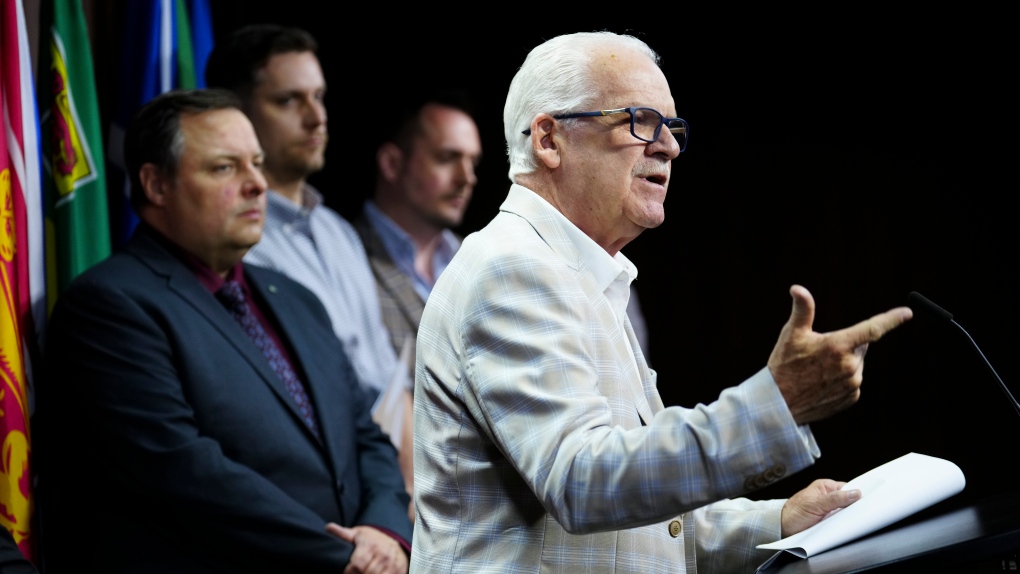Federal unions are launching legal challenges and encouraging public sector workers to file “tens of thousands” of grievances over the new mandate requiring federal workers to return to the office at least three days a week in the fall.
“The Trudeau Liberal government better prepare itself for a summer of discontent,” Chris Aylward, president of the Public Service Alliance of Canada, said on Wednesday.
The Treasury Board Secretariat announced a new hybrid work policy for the federal public service on May 1, requiring all public servants in the core public administration to work on-site a minimum of three days a week starting Sept. 9. All federal executives are expected to be on-site a minimum of four days per week.
During a media conference on Parliament Hill, the federal unions announced they have filed a policy grievance challenging the new return-to-office mandate and a labour complaint against the Treasury Board to the Federal Public Sector Labour Relations and Employment Board.
“The Liberal government’s move to force federal workers back into ill-equipped and poorly maintained offices three days a week is purely political and puts the services that Canadians depend on at risk,” Aylward said.
“Their unilateral, one-sized fits all approach to hybrid work is completely anti-worker, violates the hard won rights of federal employees and fundamentally breaks the trust of workers and unions with the Trudeau Liberal government.”
Tens of thousands of federal workers began working from home at the start of the COVID-19 pandemic. In March 2023, the government implemented the current hybrid work policy requiring federal public servants work in the office two or three days a week.
“Workers feel betrayed and we will be using every recourse we have available to fight this mandate and enforce a telework mandate that works for workers and not right-wing premiers,” Aylward said.
“We have filed a series of legal challenges against the government and we will be encouraging our members to file tens of thousands of individual grievances to force this government to withdrawal their mandate.”
When asked to explain what a “summer of discontent” could mean for the federal government, Aylward noted PSAC members with the Canada Border Services Agency remain in talks with the federal government and this will be an issue in contract negotiations.
“Whatever that looks at; whether it’s at the borders, whether that’s at the airports, whether it’s the efforts that all the unions make because we will be organizing concerted, unified actions across the country both on the streets and in the workplaces,” Aylward said.
The Public Service Alliance of Canada says it won a commitment from the government during contract negotiations in 2023 that would “protect public service workers from arbitrary government-wide decisions on telework,” including setting up joint panels in each department to review telework requests on an individual basis.
The Public Service Alliance of Canada (PSAC) President Chris Aylward, left, looks on as PSAC Regional Executive Vice-President, National Capital Region Alex Silas speaks during a press conference on Parliament Hill in Ottawa on Wednesday, May 8, 2024. (Sean Kilpatrick/THE CANADIAN PRESS)
Treasury Board President Anita Anand says the hybrid model “continues to exist,” and the federal government can decide the work arrangements for the tens of thousands of public servants.
“A hybrid work environment continues to exist. There is, for many people, a four-month transition period,” Anand told reporters on Parliament Hill Wednesday morning.
“All of that is within the jurisdiction of the government of Canada and it is executed by the departments. I will say that a hybrid work environment is not within the collective agreements. It is something that, at the time of negotiations, the government of Canada retained prerogative over to determine the scope of the hybrid environment.”
In a statement sent late Wednesday evening, the Treasury Board has said the “refinement” to the hybrid work approach is intended to “ensure greater consistency and fairness across the public service” and maximize the benefits of consistent in-person interactions.
“We recognize the benefit of hybrid work and hear the preferences of employees to maintain some flexibility. We also believe in the value of human interaction in the workplace at many levels, including during onboarding of new public servants. Moving from two to three days to a minimum of three days, as well as an increase of senior management presence to 4 days, is a calibration exercise. The objective is to maximize the benefit of presence in the workplace while maintaining flexibility,” the Treasury Board said.
The Treasury Board reiterated that the contract negotiations with federal unions in the spring of 2023 saw the employer sign letters of agreement on telework that “sit outside of collective agreements.” According to the letter of agreement, telework arrangements are subject to regular review “and may be terminated by either party at any time with reasonable notice.”
“At no time did the Treasury Board Secretariat agree to a joint review or consultation on the number of days that employees are required to work onsite. In fact, the letters of agreement themselves reinforce the employer’s exclusive right to determine place of work,” the Treasury Board said Wednesday night.
The unions accuse the federal government of mandating workers back to the office to support businesses in downtown Ottawa.
“The government has zero evidence to show why this is improving productivity or employee wellbeing, and they just seem to be catering to downtown business coalitions, to municipal politicians and to (Premier) Doug Ford,” Nathan Prior, president of the Canadian Association of Professional Employees, told reporters.
In March, Ford called on Prime Minister Justin Trudeau to bring employees back to the office in downtown Ottawa more days a week.

